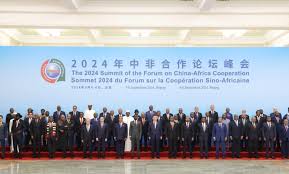In recent years, South Africa has faced an urgent need to shift its energy focus.
As a country highly reliant on coal, South Africa grapples with frequent power outages, an unstable grid, and environmental challenges.
Meanwhile, China, a global powerhouse in renewable energy investment, has started playing a notable role in helping South Africa rethink and rebuild its energy landscape.
But what does China’s investment really mean for South Africa’s renewable energy journey? And how could it shape South Africa’s future in terms of energy independence and environmental sustainability?
Let’s dive in to explore China’s impact on South Africa’s renewable energy sector, the mutual benefits involved, and what it could mean for the country’s carbon footprint.
Why South Africa is Moving Towards Renewable Energy
South Africa’s energy sector has historically been tied to coal. Almost 85% of the country’s energy comes from coal-fired plants, making South Africa one of the highest carbon emitters in the world. However, this dependency is becoming unsustainable due to environmental degradation, health impacts, and increasing costs.
With these pressing issues, South Africa is looking for cleaner and more reliable energy sources. This is where renewable energy—wind, solar, hydro, and even battery storage—comes into play. And China, one of the world’s leading investors in renewable energy, is emerging as a key partner in this transformation.
China’s Approach to Renewable Energy at Home and Abroad
China has made impressive strides in renewable energy within its borders. From leading in solar panel production to heavily investing in wind farms and hydroelectric power, China has positioned itself as a global renewable energy leader. But beyond its borders, China’s investments in renewable energy in other countries, including South Africa, are also growing.
Through its Belt and Road Initiative (BRI), China has been funding infrastructure projects worldwide, many of which include energy investments. With South Africa, China’s involvement in renewable energy reflects a partnership in which both nations stand to benefit. China gains more global influence and market reach, while South Africa receives essential funding and technology for its renewable energy initiatives.
Key Chinese Investments in South Africa’s Renewable Energy Sector
China’s investments in South Africa’s renewable energy have focused on several primary areas, particularly in solar and wind projects. Here are some notable examples:
Wind Energy Projects: China’s Longyuan Power Group, part of the China Energy Investment Corporation, has been involved in developing wind power in South Africa, notably through the De Aar Wind Farm in the Northern Cape. This wind farm produces hundreds of megawatts of clean energy, directly contributing to the South African grid and reducing dependence on coal.
Solar Power Initiatives: Another area where Chinese firms have invested is in solar power. Companies like Jinko Solar, one of the largest solar module producers globally, have set up operations in South Africa, supplying solar panels and technology to boost local energy production. Solar energy can be especially effective in South Africa, given the country’s high levels of sunlight.
Battery and Storage Solutions: One of the significant challenges with renewable energy is storage—how to store energy for use when the sun isn’t shining or the wind isn’t blowing. Chinese technology companies are working with South African counterparts to introduce advanced battery storage solutions that can help South Africa stabilize its grid and make renewable energy a more dependable option.
These projects aren’t just about bringing in clean energy; they are creating jobs, fostering skills transfer, and helping South Africa gradually reduce its dependency on coal.
Environmental Impact: How China’s Involvement is Helping South Africa’s Carbon Footprint
South Africa’s reliance on coal means its carbon footprint is substantial, which has implications for global climate change efforts. By investing in renewables, China is contributing to reducing South Africa’s carbon emissions.
When wind and solar power replace coal plants, the amount of carbon dioxide (CO₂) and other greenhouse gasses released into the atmosphere decreases. According to some estimates, the renewable energy projects backed by Chinese companies in South Africa could reduce millions of tons of CO₂ emissions annually.
A shift toward renewable energy also reduces air and water pollution—another significant benefit. Traditional coal-fired power plants emit not only CO₂ but also pollutants that harm air quality and local ecosystems. Moving to wind and solar can alleviate some of these health and environmental issues.
Economic and Energy Independence: A New Era for South Africa
One of the broader goals of renewable energy investment is to make South Africa more energy independent. Right now, with Eskom Hld SOC Ltd, a South African electricity public utility, struggles and load-shedding a recurring issue, South Africa is somewhat limited in its capacity to meet its own energy needs reliably.
China’s involvement in renewable energy can help South Africa achieve greater energy independence in several ways:
Diverse Energy Sources: Relying on various renewable sources such as solar, wind, and hydro can make South Africa’s energy grid more resilient. If one source falters, others can compensate, unlike a coal-dependent system, which fails when a major plant breaks down.
Reducing Fuel Imports: By harnessing its abundant solar and wind resources, South Africa can cut down on fuel imports required for coal and other fossil fuel-based energy. This not only helps in reducing greenhouse gas emissions but also keeps money within the country, boosting local economic development.
Economic Growth and Job Creation: Renewable energy projects funded by Chinese firms can create job opportunities in construction, operations, and maintenance. They also promote technology transfer, allowing South Africans to learn valuable skills in renewable energy technologies, which could be applied to other industries as well.
Potential Challenges in China-South Africa Renewable Energy Collaboration
While the partnership between China and South Africa in renewable energy offers numerous benefits, it’s not without challenges. Some concerns include:
Debt and Dependency: Some critics argue that by relying on Chinese financing, South Africa could fall into a “debt trap” where it becomes overly reliant on China for funding. This risk highlights the need for responsible borrowing and management of Chinese investments.
Environmental and Social Impact: While renewable energy is generally positive for the environment, large projects, especially wind farms, can impact local ecosystems and communities. Proper environmental assessments and community involvement are essential to ensure that renewable projects don’t come at the expense of local well-being.
Quality and Standards: Ensuring that Chinese technology meets South African standards is vital. This includes everything from the durability of solar panels to the efficiency of wind turbines. Any poor quality can lead to inefficiencies and higher maintenance costs, undermining the benefits of renewable energy.
The Path Forward: What’s Next for South Africa’s Renewable Energy Transformation
With China’s involvement, South Africa has the potential to become a renewable energy leader in Africa. By leveraging Chinese technology, financing, and expertise, South Africa can gradually shift from a coal-heavy energy system to a cleaner, more sustainable one. Moving forward, South Africa can explore expanding its renewable portfolio to include geothermal and tidal energy, in addition to wind and solar. Building stronger local policies and frameworks around renewable energy can also ensure that investments are channeled in a way that benefits South Africa’s long-term goals.
A Partnership for a Sustainable Future: China’s investment in South Africa’s renewable energy sector represents a promising shift toward a greener, more sustainable future. It’s not just about reducing South Africa’s carbon footprint; it’s about creating a resilient energy system that empowers South Africans and boosts economic growth.
As South Africa embarks on this journey, the involvement of Chinese companies could mark a new era in energy independence, environmental responsibility, and international collaboration. While challenges exist, this partnership holds the potential to be a driving force in Africa’s renewable energy transformation, proving that with the right support and direction, even the most
coal-dependent countries can chart a sustainable future.






